🇹🇭 100 Lessons from 100 Days in Thailand
A Crash Course in Thai Culture, Traveling, and Teaching English
One hundred days in Thailand. One hundred days of sweating, smiling, struggling, and learning.
I’ve fumbled my way through new cultural norms, eaten things I couldn’t pronounce, taught English to kids who (adorably) tested my patience, and learned a whole lot about what it means to live here rather than just visit.
Some lessons were obvious (don’t drink tap water), others were unexpected (what shaving your head means), and a few hit me like a Muay Thai kick to the face (RIP my weak right ankle).
A quick overview of the seven parts
🌏 General Life Tips (a.k.a. Stuff I Wish I Knew Sooner)
🙏 The Unspoken Rules of Thailand Culture
🌶️ Food & Language: Spicy, Sweet, and Everything in Between
🛵 Travel Tips & Surprises
🏫 Life Inside a Thai School
📚 Teaching Flops and Fun Times
Lesson 1️⃣0️⃣0️⃣
So here it is—100 things I’ve learned, laughed at, and sometimes cried over during my first 100 days in Thailand.
🌏 General Life Tips (a.k.a. Stuff I Wish I Knew Sooner)
Let's start with some basics. These are the little things that will either save you from awkward situations or just make daily life smoother.
There are stray dogs that can attack you. Be aware.
If elephants are offered to ride on top, do not support this business. It’s not ethical. I went to a sanctuary called Walk Camp outside of Chiang Mai and had a gorgeous time.
Don’t flush TP down the toilet. It goes in the small trash. Bring your own, too, just in case.
Avoid skin products that say they “brighten” or “whiten” your skin. They mostly have bleach in them.
Like in Hawaii, take your shoes off before entering someone's home. Slippers at the house are nice.
PM2.5 pollution is the worst thing I’ve learned about this year. The harmful fine dust particles affect air quality and health, mainly due to seasonal agricultural burning in northern Thailand, Laos, Myanmar, and parts of Cambodia and China. The burning of sugarcane, corn, and rice fields contributes to the toxic haze. In 2024, the pollution peaked from February to April but lingered until June in some regions. Fingers crossed it clears up faster this year.
Take selfies. Everyone usually loves them.
They drive on the left side of the road here, and while there are sidewalks, good luck actually walking on them—vendors, parked motorbikes, and surprise potholes tend to take over.
There is a monsoon rainy season. It’s in the summer months.
Thai people will think you’re crazy if you sun tan.
The ice is consumable. They freeze filtered water. You won’t get sick from it. Also, you can brush your teeth with tap water, but it’s not potable water from the tap, so don’t drink it.
Expect to see a lot of plastic bags—it's just how things are done here. Even for carrying plastic cups, there are special mini-bags with handles.
🙏 The Unspoken Rules of Thailand Culture
Thai culture is built on respect and kindness. It’s also full of customs that might not be obvious at first—like how your head is sacred, feet are frowned on, and elders should always be greeted with a polite bow.


Let’s dive into the little things that make Thai culture so unique.
The culture here can be summarized as polite and considerate. The language literally has gendered phrases of ka or krab that end anything you say to signal politeness. When in doubt near someone running on a track or sitting next to them on a bus, just say ka and bow to be polite.
Elders are respected most. Show the “wai” before them so that you are acknowledging that you see them.
Age is a big deal for how to show respect to someone. If they are older than you, address them as “pi”, and if they are younger, then you address them as “nong”. Always do the head bow first to a senior with your thumb under your chin.
If you see a male with a shaved head he probably did this to honor someone passed in his family and didn't do it as a fashion statement.
Education is very important and seen as the way to be successful. (as opposed to America, where I see many kinds of success without a college degree, like Steve Jobs or Bill Gates.)
Muay Thai is fun until you have a weak ankle, and all the kicking and jump rope makes it swell. It takes some getting used to be able to punch someone. My roommate loves it.
Songkran is the Thai New Year in April and it’s like the world’s biggest water fight in April. My students love it because they get to play and be impolite and dump buckets of water onto adults. But it's not just for laughs—the water fights are a fun but deeply symbolic part of cleansing and renewal before the rainy season..
Being a teacher is a respected government job, and you even get a pension if you stick it out until 60. That said, there are higher-paying government jobs—doctors and high-ranking officials usually earn more.
Heads are sacred, so don’t ever touch them. No head nuggies.
Feet are looked down on, so don’t put them up on tables or near someone.
Thais love using stickers and the green Line messaging app.
This place is known as the land of smiles because English is dominantly not known. That is okay. We can read body language and smiles. Smile back. The children will most likely know English better as they have at the swimming pool, at the art store, and at the flower festival.
Similar to how the United States is a Christian country (with God mentioned at least once in each of the 50 state constitutions) and all businesses are closed on Christmas day, Thailand is a Buddhist country, so there are Buddhist holidays where businesses may close, but it’s not a full countrywide shutdown. The main thing to know? On big holidays like Makha Bucha and Visakha Bucha, alcohol sales are banned. Buddhism has a major influence on daily life in Thailand. That said, Thailand is a constitutional monarchy, not a Buddhist state, but the presence of temples, monks, and religious holidays is everywhere.
Not all the famous temples are active places of worship. The White Temple and Blue Temple in Chiang Rai are stunning, but they’re more tourist attractions than places of deep religious practice. The White Temple is actually an art installation (with a slightly terrifying vision of the afterlife), while the Blue Temple still functions as a place of worship.
Buddhism is the main religion of Thailand does not mean that the lay people, or non-monastic people, have an active spiritual practice. Monks wear those classic orange robes, but female monks (bhikkhunis) aren’t officially recognized in Thailand’s Theravāda tradition. Instead, you’ll see mae chi—women in white who follow religious precepts, but with a lower status than monks, often called a nun.
Similar to the US, where most Catholics only go to church for Christmas and weddings, I haven’t found many Thais who identify as Buddhist and are devout in their faith. However, I do see an undercurrent in society, which is that Thais believe in karma and nonviolence. This has meant my motorbike doesn’t get stolen when I leave the key in it. It’s frowned upon to kill things, even the spider crawling at home or plucking a pretty purple flower from its vine.
There is a king, and you will see him everywhere, on baht money, in pictures on the roads, in schools. If you see him in real life, you are not allowed to take a picture of him. Thailand was never colonized, and Thais are proud of that. But, fun fact: they made some strategic land concessions to the British and French to keep things that way. Smart moves.
There are toilets at fuel and bus stations, but you will most likely need to pay three baht, and there won’t be toilet paper, and it’ll be a squatty toilet which means it’s a porcelain hole in the ground that you stand over and put pour buckets of water over after to flush. Plumbing à la bucket.
Pétanque, a game with French origins, is similar to bocce ball but involves tossing a ball to land as close as possible to a target ball. It's an enjoyable and strategic game that requires precision and skill.
Sepak takraw is a traditional Southeast Asian sport that combines elements of football and volleyball. I watched it in action during Sport Week, and it was impressive to see.
🌶️ Food & Language: Spicy, Sweet, and Everything in Between
Thai food is amazing—but also a game of spice roulette. Ask for "not spicy," and you might still breathe fire. Thai language? Beautiful but full of tricky tones.
Here’s what I’ve learned about eating, ordering, and speaking after embarrassing myself so you don’t have to.
Khao soi is a northern dish and if you ever get the opportunity to try it, please do. It’s my favorite and is normally served with chicken. Ask for no spice, and it's still flavorful
.
If you can’t eat spicy, saying “mai pet” is your new best friend.
Thai language is only spoken in Thailand and by Thais who live around the world.
Chopsticks are used to eat, but spoon and fork are used more. You'll learn how to cut meat like a pro with a soup spoon here. There are never knives.
There are a bunch of noodle stands on the side of the road that are tasty. The yellow ones with the red number 4 in seven eleven parking lots have yummy pork egg noodle soup. Point at the pictures to order, and it will be okay.
The restaurants will sometimes have sinks where you can wash your hands before and after you eat since the sticky rice is eaten with your hands. Usually, there’s never a towel.
If you order a salad, it will most likely be som tom, which is papaya salad without leafy greens. It will be spicy unless you ask for no spice.


If you like raw vegetables, the buffet garnish on the side.
Sticky rice, or any rice is your best friend if you get food too spicy. Milk helps more than water.
Suki is a dish that is rooted in China, and the Thais make it deliciously. It’s not spicy and it’s a beautiful bowl of tasty noodles I enjoy at my school canteen most days.
Always say less sugar. This country had a love affair with condensed milk in its beverages. Unless you’re from the southern US and love sweet tea, I recommend ordering any beverage with “wahn nit noi” and pinching your fingers together.
If you need cash with smaller bills, go to seven eleven. They have so much money and can always give you change in smaller bills. I’ve seen some Thais use Seven as a legitimate bank to withdraw thousands of dollars.
7/11 is everywhere, and as much as I prefer to support small businesses, you'll learn to love 7/11. I recommend the croque monsieur toasty, the mint chocolate protein milk, the lemon vitamin water and the bags of peanuts.
There is northern Thai food which is influenced by Burma, also known as Myanmar.
Pork is abundant.
The “ed”, “sk”, “r”, and “th” sounds are the hardest for Thais to say because they are sounds that don't exist in their language.
The language has 5 tones, 44 constants, 32 vowels, and no punctuation like spaces.
555 means hahaha.
🛵 Travel Tips & Surprises
Thailand is a traveler’s paradise, but paradise comes with a few plot twists. Like how bus tickets sell out way earlier than expected, 7/11 is actually a lifesaver, and motorbikes are both the best and scariest way to get around.
Here’s what I wish someone had told me before my first road trip adventure.
The highest rate of motorcycle-related accidents and fatalities that happen in the world are in Bangkok, Thailand.
If you ever get on a motorbike, wear a helmet. Having an eye cover helps with bugs and debris as well. It’s worth the investment and gives you some peace of mind. It gets chilly at night with the wind, so bring a jacket or windbreaker.
If you don’t rent a motorbike, then Grab and Bolt are your new best friends for requesting lifts by car. Rod-Daeng or Red trucks are also popular ways to get large groups of people around the populated cities.
You can rent buses at the station, but they might be sold out before you get there, so buy them on the “12Go” app even if they cost more money.
Buses sell out so buy both ways before you leave so you don’t need to get a pricey private car to get back.
Use Google Maps instead of Apple Maps. It’s just better in every way and what most of the world uses too.
If you get a hostel and value your sleep, I recommend not getting one on a main street.
You can get a Thai number sim card for a year with 100 GB of data from True for 65USD.
Moo Deng is a famous hippo that lives outside of Bangkok.
The dragons swim in water rather than fly in the air and are called phayonak.
Night markets are everywhere, and the bright lights and loud music will shoot your nervous system.
They have QR codes to scan here from a Thai bank account that are popular as a form of payment.
The name of the money is baht. It's about 30 baht to 1 USD at the moment
Pai is a small hippie town full of foreigners in the north that take 500 plus winds in the road to get to. If you go, I recommend going to the park. I wrote about my time there here.
Where one of my coworkers is from in Maemon Village in the north, they speak Akha which is traditionally an oral language that is completely different than Thai. Akha is more similar to Burmese, while Thai is more similar to Lao.
Despite the north being far away from the sea, the Ngao District, located in Lampang Province, Thailand, is known for its freshwater prawns. These were the biggest prawns I’d ever seen in my life.
🏫 Life Inside a Thai School
Teaching in Thailand is nothing like the school system I grew up with. There are school-wide dance parties, last-minute holidays, and more tests than I can count. The kids are hilarious, the schedules are confusing, and somehow, it all works.
Here’s what goes on behind the scenes in Thai schools.
Hierarchy is a big deal at the school, so culturally, the director is like the king of the school. Make sure to always bow at him first and always follow as he says.
There’s Student’s Day, where the school puts on a show to support the students in their entrepreneurial pursuits of selling things and supporting them in their talents like music or dancing. It is a joy to see.
The kids will take a lot of tests, even on most weekends. Thai teachers will need to work as well to proctor the aforementioned beautiful standardized tests. C’est la vie. I cannot change the system.
Sports day is a BIG deal. There are dances and floats, and it’s sort of like a homecoming but even more intense than that. Classes are all canceled for the week.
There is a school song that is blasted on the PA system as the flag rises each day.
Wear yellow on Mondays. Thai traditional dress on Fridays.
If someone doesn’t like your shoes, they will tell you that someone else’s shoes are more polite, and that is better.
Join in on the TikTok dances even if it seems stupid– it’s what they like to do for fun.
To get your Thai visa, you’ll need a teacher’s license and work permit, which means visiting the immigration office and the Ministry of Education office, getting AI-edited passport photos taken, and spending some time at the hospital for a medical check—including a blood test for certain diseases. The whole process can take anywhere from a few weeks to two months. (It took the latter from my experience.)
When living on a boarding school campus without privacy, curtains are a nifty invention.
Try out sitting at different tables at the canteen. Sometimes, you won’t have any shared language with the math department, but you can still sit there, smile, and enjoy your food together. I make it a point never to eat lunch with my phone so that I can engage with my food and with others around me.
📚 Teaching Flops and Fun Times
Teaching English to Thai students is part lesson planning, part stand-up comedy, and part magical chaos. Some things work like a charm (games, group activities, being ridiculously animated). Others? Total disaster.
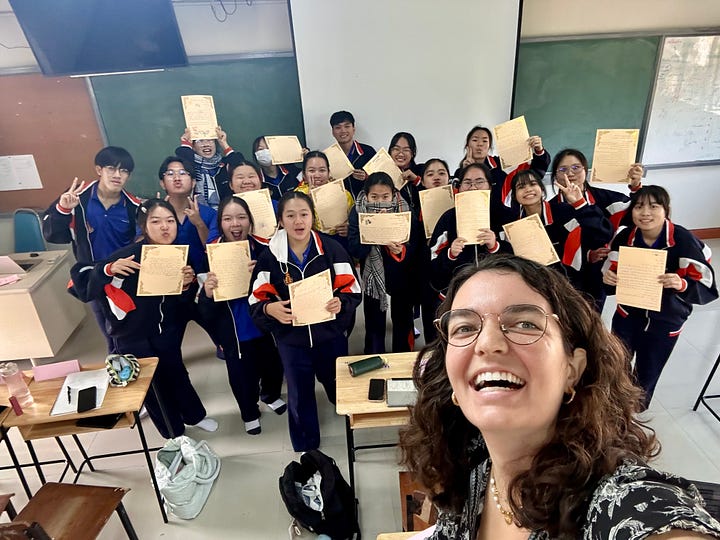
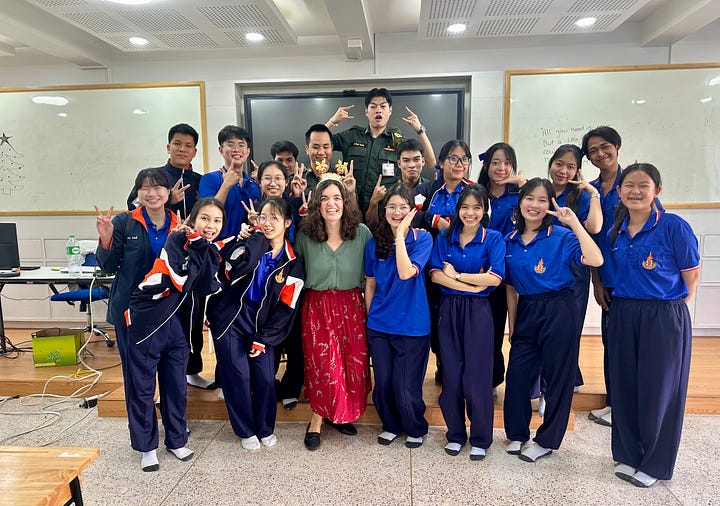
These are my best tricks, biggest flops, and the teaching hacks I swear by.
Prepare to feel constantly out of the loop. The announcements at the PA system blast in Thai only. You might not know about a day off until an hour before. Just feel used to being out of the loop.
These are children, so whenever possible, encourage them to be creative or draw doodles. The world hasn’t gotten to them, telling them they aren’t creative. Purely giving them markers to make a name tag is fun for them.
Creating a one-word per student story in a snaking chain around the classroom is a hoot!
Play the video slower and with closed captions. YouTube has bigger captions than TED.
Have slides so they can read the assignemnt since they are better at reading than listening.
Make a table of notes each day to capture reflections at the end of class.
Have lesson plans as a menu of options based on what is receptive to the students. Sometimes, a worksheet.
Tell them to go to the bathroom one at a time so they don’t throw a party in the bathroom.
Keep it simple. Complexity creates confusion and lowers their self-esteem. I want my students to walk out of my class feeling more confident and encouraged each time. When in doubt, review what they already learned to make sure they didn’t forget the vocab or idiom phrases.
Have students make name tags and take pictures of them with them so you can create a name chart to memorize their names. It helps you learn all their 200 names and take attendance, too.
Playing with kids outside of school will allow you to connect with them. When they like you more and see you as a human, they’ll be more motivated to engage in your class in school. These will be the students who turn their assignments in first.
Worksheets keep students awake. Going over the answers for the worksheet by snaking around the room is useful because then it turns into a reading, writing, listening, and speaking exercise.
Sometimes, it’s okay to let them sleep. Their body clearly needs rest.
Play games. You can even invent a game where they grade their own work, so you have less work to do. When in doubt, play hangman. It’s better than having no game and it makes them think.
Use the wheel of names game so that the kids will see who goes first randomly.
When you have different levels, try to have the smarter students teach the less competent ones.
Know the objective of the class so you can improvise based on how the attendance and energy level of the class.
Drilling feels rudimentary but is necessary to get everyone to speak the word.
When using AI to make worksheets, make sure to share the CEFR level and context of what you’ve taught them before to generate better results.
Adjust the lesson as it’s being received. If they need to rewatch the video, let them listen on their own. If I am bored from a lesson, I need to spice it up because the kids will be too.
When possible, avoid calling out students to save face on their behalf.
Be animated. Use expressions to keep them engaged. Laugh at yourself if necessary to make them laugh. Be goofy since these are kids, after all. It’s fun to have fun.
See what you can learn from the students. They each have interests that light them up. It just takes getting them comfortable enough to share and showing that you care while you listen and ask them.
And finally, my last lesson.
Lesson 1️⃣0️⃣0️⃣: Stand up for your needs.
Yes, adventure is saying “nit noi” to a little spice and hoping for the best, but sometimes, self-care means not spending the night on the toilet or debating a 4 AM hospital visit while talking through my heartburn with ChatGPT. So, I’ve learned to Nap when I’m tired. Drink the water, even if it means buying a plastic bottle. Skip the night bazaar if my social battery is on fumes. And if two massages in a week feels needed, then I’m going for it. Allowing myself to enjoy the loner sports like running and swimming has given me quality time with myself rather than fighting muay Thai, playing tennis or volleyball.
Saying yes to everything sounds fun—until I realized it was messing up my energy, sleep, and ability actually to show up for my job feeling ready. So, I’ve started standing up for what I need, even if it means getting shut down while requesting not to turn my desk away from the window in the foreign language office to match the 12 other teachers. Sometimes, even if everyone is being polite, it doesn’t mean I need to be too. My needs are important.
100 days, 100 lessons, and a whole lot of memories.
Thailand has been a wild ride so far, and I can’t wait to see what’s still in store.
~~~
If you’ve been here, what lessons did you learn? Or, if you’re planning a trip, what are you curious about? Let’s swap stories. 😊
~~~
Usually, I have an update below on what’s inspiring me and happening in my life. And what’s happening in my life right now is that I’m taking on too much stress on behalf of my failing students, and I need to go to bed. My half marathon is T-28 hours, so rest is my A1 priority at the moment.
Happy Chinese New Year. Wishing you all much prosperity and wisdom this year of the snake. 🐍
So until next week, too da loo.
~~~
I appreciate you reading this!
If ideas resonated, I’d love you to press the heart button, leave a comment, reply to this email, or reach me at vermetjl@gmail.com.
Keep on learning 😁
K̄ha bhuṇ ka 🌺 🌺
Jen
PS - in case you missed last week’s letter on unwrapping the gift of time.
PPS- if you’d like to read my favorite letters, the best way to encourage my work is to buy my book here.





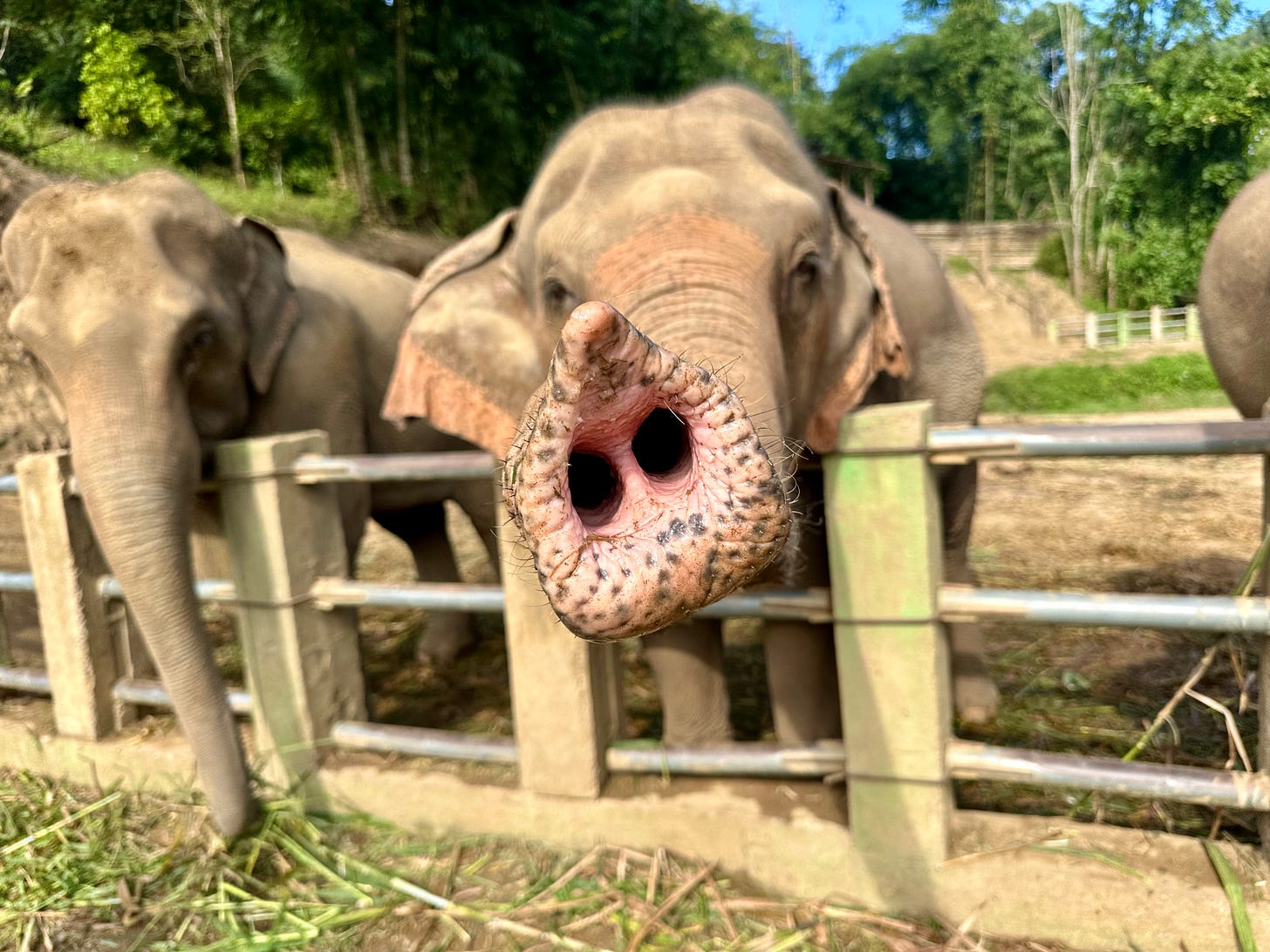

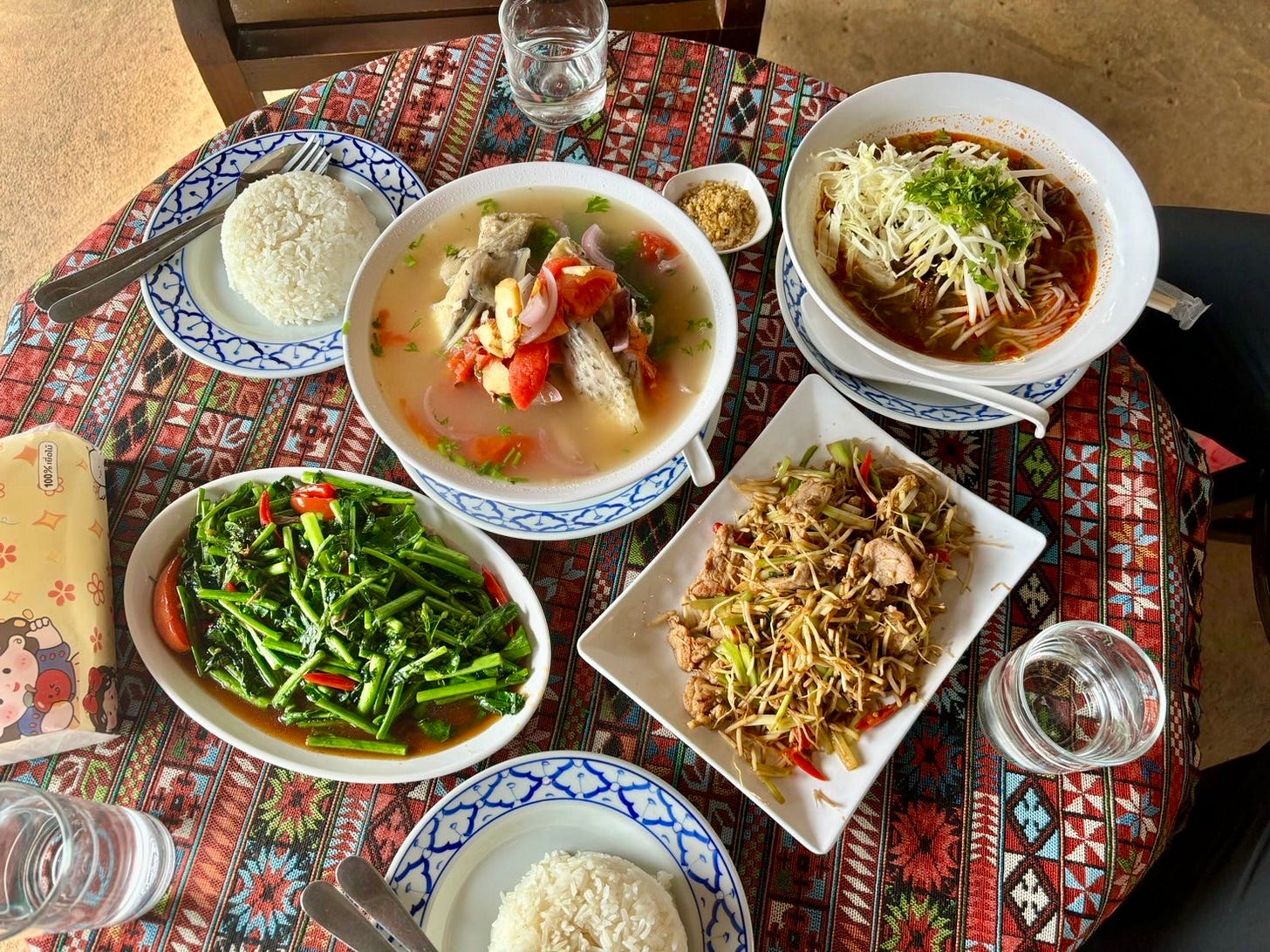
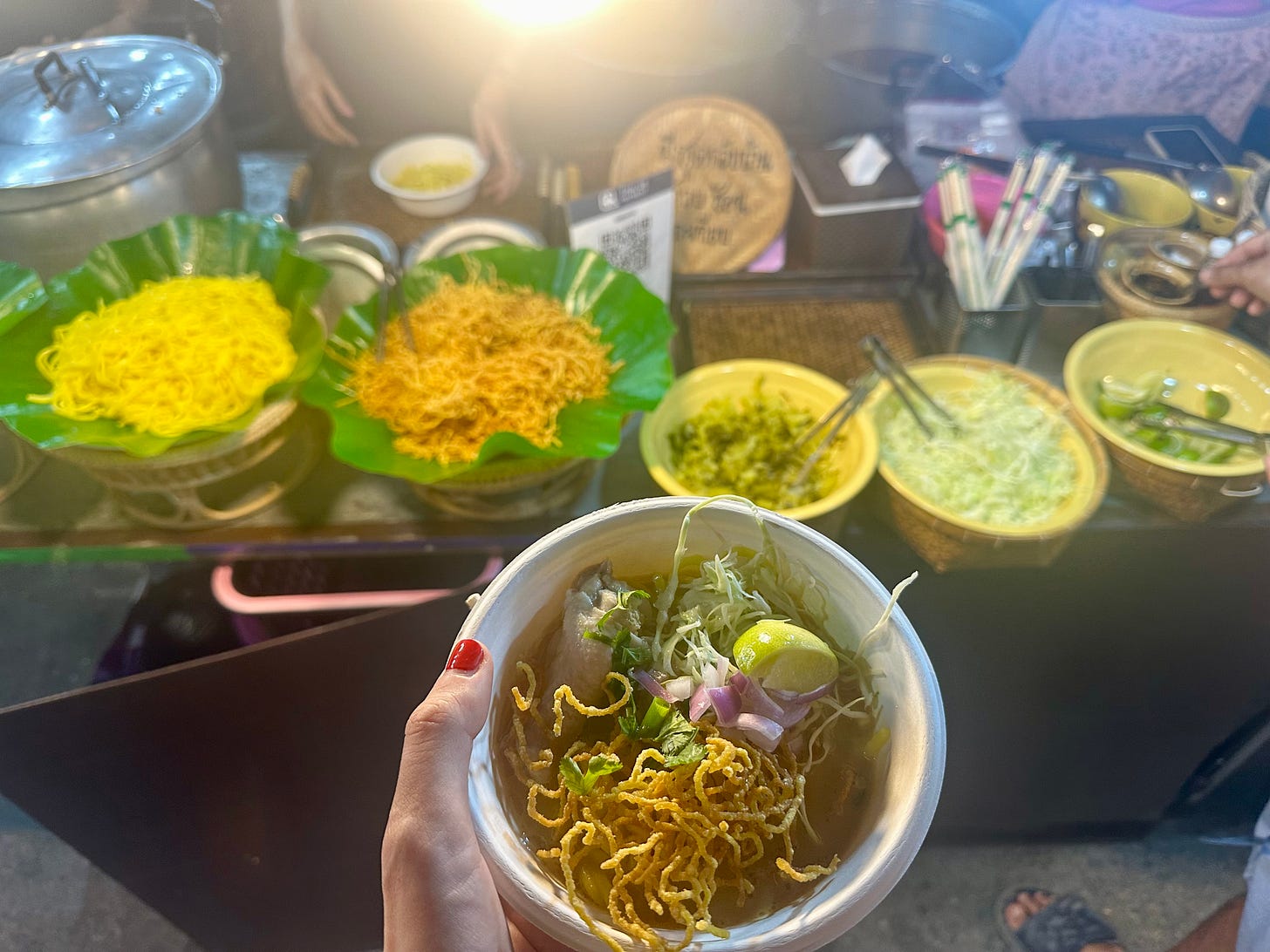
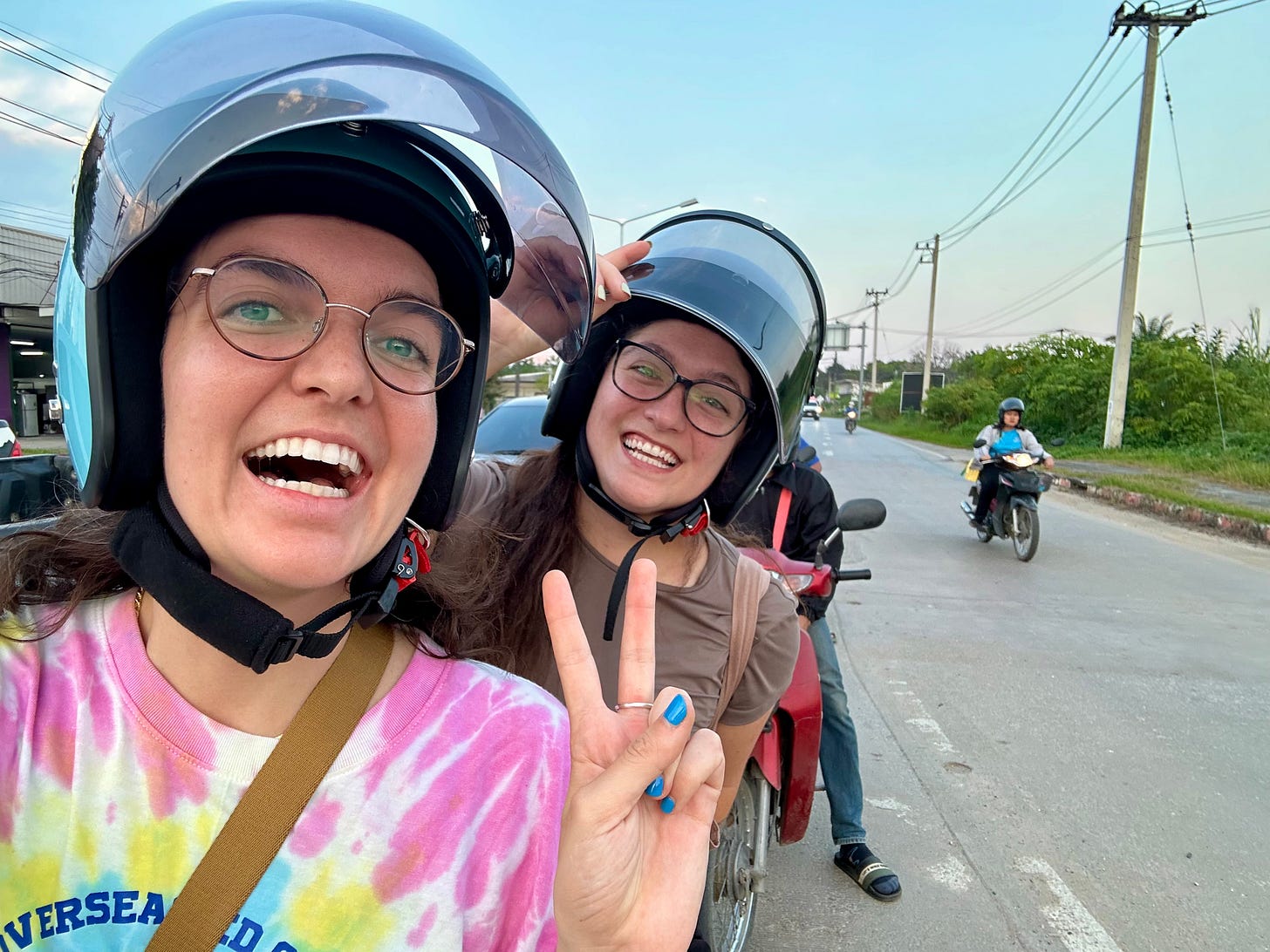



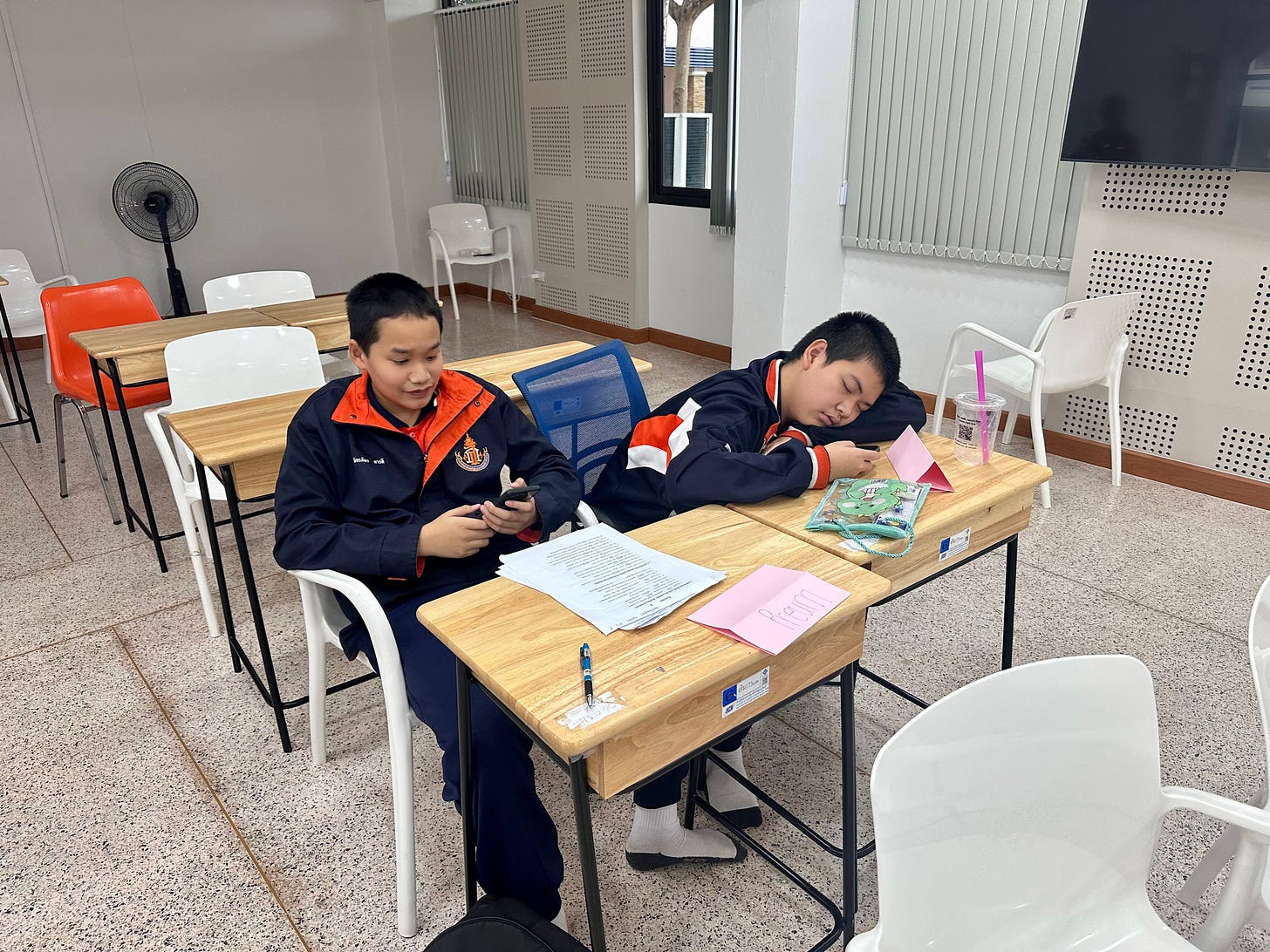

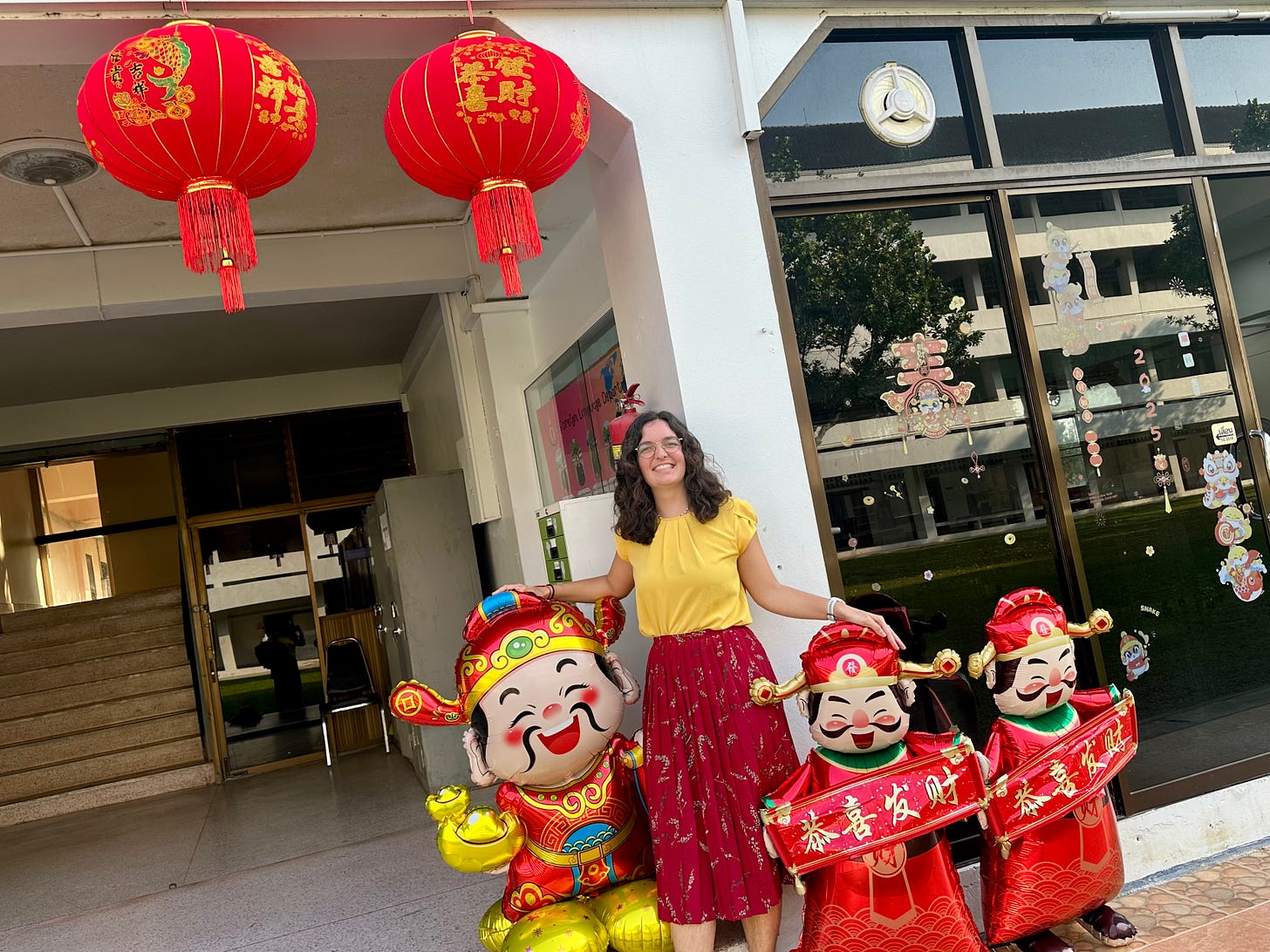
Love your newsletters. This one was awesome! You’re leading a wonderful life!
I can't believe it's been 100 days! What a cool reflection, I learned so much and it seems like you're learning so much through doing!